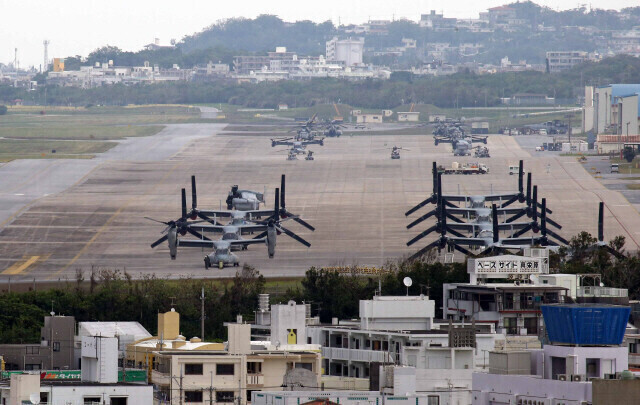hankyoreh
Links to other country sites 다른 나라 사이트 링크
[Column] Korea’s new president and the coming new Cold War


After spearheading the Allied victory of World War II, then-UK Prime Minister Winston Churchill delivered a fascinating speech on March 5, 1946, at Westminster College in Fulton, Missouri, in which he predicted the coming of the Cold War.
In an address that went down in history as the “Iron Curtain” speech, Churchill said, “from Stettin in the Baltic to Trieste in the Adriatic, an iron curtain has descended across the Continent,” referring to the Soviet Union.
After the devastating war that cost the lives of 20 million citizens, the Soviet Union ignored the free will of Eastern Europeans and imposed communist regimes friendly to Moscow, citing security concerns. In response, the US implemented a massive containment policy. This was the beginning of a long Cold War that would continue for nearly half a century.
While listening to US President Joe Biden’s first State of the Union speech on March 1, Churchill naturally came to mind. The more I listened, the more I felt that Biden’s address may also go down in history as the speech that declared the coming of yet another, new Cold War.
In his speech, Biden declared that “freedom will always triumph over tyranny.”
“Six days ago, Russia’s Vladimir Putin sought to shake the foundations of the free world thinking he could make it bend to his menacing ways. But he badly miscalculated,” Biden continued.
Since taking office, Biden has reiterated his stance that humanity is now at an “inflection point” in the fight between democracy and dictatorship — a point was proven correct when Putin made that fateful decision on Feb. 24 to invade Ukraine. If the old Cold War was a confrontation between the economic systems of capitalism and communism, then the new Cold War could be said to be a conflict between the political systems of democracy and authoritarianism (or dictatorship).
The world must unite and face head-on those who disregard the basic values we believe in, such as democracy, rule of law, observance of international norms, and peaceful resolution of disputes, and who instead seek to obtain what they want through violence.
Just like the containment policy of the old Cold War, Biden is coming out with enormous measures every day to drive Russia out of the modern capitalist economic system, a policy line that is unlikely to change anytime soon.
The new Cold War, which started with the war in Ukraine, will inevitably bring about significant changes in East Asia, which is living with its own authoritarian power in China — a country that has neither criticized Putin nor participated in sanctions against Russia.
The two main hotspots in the region are none other than the Korean Peninsula and Taiwan. In particular, as China’s military pressure on Taiwan has become more explicit in the last year, tensions throughout the region are increasing day by day.
Regarding Taiwan, Japan is working to further strengthen the US-Japan alliance so that it can respond in the event the situation gets out of hand. Japan is acting this way due to its perception that a crisis for Taiwan is a crisis for Japan.
In contrast, South Korea sees what’s happening with Taiwan as having little to do with Korea, to some extent, and is maintaining its distance to prevent being dragged into a potential conflict.
Although it is a concept that may be unfamiliar to modern Koreans, when looking at the world through the Cold War framework, the security of the Korean Peninsula, Japan and Taiwan are inextricably linked like the two sides of a coin.
For example, Syngman Rhee, Park Chung-hee, and Chiang Kai-shek of Taiwan, who all lived during the Cold War, responded sensitively to what happened in Okinawa in the late 1960s, which directly affected the security of Korea and Taiwan.
When Okinawa, the location of a massive US military base, was about to be returned to Japan, the issue received a sharp reaction given that it was directly related to the security of all free countries in the Far East.
This was also because the Kadena Air Base in Okinawa had acted as the base for the bombers that hit North Korea during the Korean War, as well as being a forward base for the US military to intervene in the event of an incident in Taiwan.
As a result, the joint statement between Nixon and Sato released in November 1969 included the phrases noting “the security of the Republic of Korea was essential to Japan's own security” and “the maintenance of peace and security in the Taiwan area was also a most important factor for the security of Japan.”
As the aftermath of the new Cold War also affects East Asia, calls for military cooperation between South Korea, the US, Japan, Taiwan and Australia will steadily rise. How, then, should we respond to this unwelcome "unfamiliar past”?
I think this is the biggest diplomatic and security task that Yoon Suk-yeol, South Korea’s newly elected president, will have to deal with over the next five years.
Please direct questions or comments to [english@hani.co.kr]

Editorial・opinion
![[Guest essay] Preventing Korean Peninsula from becoming front line of new cold war [Guest essay] Preventing Korean Peninsula from becoming front line of new cold war](https://flexible.img.hani.co.kr/flexible/normal/500/300/imgdb/original/2024/0507/7217150679227807.jpg) [Guest essay] Preventing Korean Peninsula from becoming front line of new cold war
[Guest essay] Preventing Korean Peninsula from becoming front line of new cold war![[Column] The state is back — but is it in business? [Column] The state is back — but is it in business?](https://flexible.img.hani.co.kr/flexible/normal/500/300/imgdb/original/2024/0506/8217149564092725.jpg) [Column] The state is back — but is it in business?
[Column] The state is back — but is it in business?- [Column] Life on our Trisolaris
- [Editorial] Penalties for airing allegations against Korea’s first lady endanger free press
- [Editorial] Yoon must halt procurement of SM-3 interceptor missiles
- [Guest essay] Maybe Korea’s rapid population decline is an opportunity, not a crisis
- [Column] Can Yoon steer diplomacy with Russia, China back on track?
- [Column] Season 2 of special prosecutor probe may be coming to Korea soon
- [Column] Park Geun-hye déjà vu in Yoon Suk-yeol
- [Editorial] New weight of N. Korea’s nuclear threats makes dialogue all the more urgent
Most viewed articles
- 1Behind-the-times gender change regulations leave trans Koreans in the lurch
- 2Family that exposed military cover-up of loved one’s death reflect on Marine’s death
- 3Yoon’s revival of civil affairs senior secretary criticized as shield against judicial scrutiny
- 4South Korean ambassador attends Putin’s inauguration as US and others boycott
- 5Marines who survived flood that killed colleague urge president to OK special counsel probe
- 6‘Weddingflation’ breaks the bank for Korean couples-to-be
- 7Hybe-Ador dispute shines light on pervasive issues behind K-pop’s tidy facade
- 8Lee Jung-jae of “Squid Game” named on A100 list of most influential Asian Pacific leaders
- 9Yoon’s broken-compass diplomacy is steering Korea into serving US, Japanese interests
- 10U.S. band that performed in N. Korea looking forward to going back